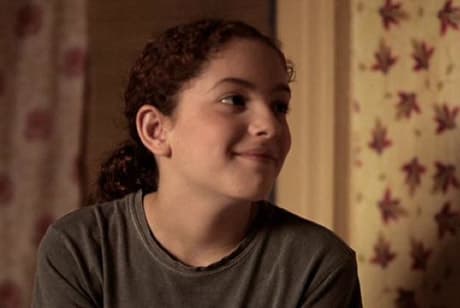Aesthetically, Ela Thier's feature-length adaptation of her slightly more concise short film, A Summer Rain (also included with this DVD), looks and feels a lot like Todd Solondz's Welcome to the Dollhouse. There's no kidnapping and no teenage girls harassing each other in the washroom about having to take a dump, but the clumsy, amateurish exchanges and inconsistent lighting and grain of film reflect indie '90s filmmaking. In a way, this helps Ela Thier's well-intentioned vanity piece about her experiences in early '80s America as an Israeli immigrant. There's an overall sense of grass roots intimacy as Ellie (Noa Rotstein) struggles to learn English and adapt to pre-teen American culture, limited to long distance pen pal exchanges with a friend back home. And since she knows only a handful of English words, Rotstein's frequent blank stares and wooden delivery of dialogue work to exacerbate her feelings of alienation in a new environment, unlike the Charlie Brown ("womp, womp, womp") presentation of Anglophone teachers as a cinematic representation of her inability to understand the language. Of course, the purpose of Thier's moderately touching, but painfully sluggish coming-of-age drama is to accentuate the importance of friendship during healthy childhood development. Ellie eventually reaches out to the similarly isolated Thuy (Dalena Le), a Vietnamese immigrant with a greater grasp of the English language. Embarrassed of her apartment dwelling and familial financial hardships, Thuy projects inexplicable difficulties onto their friendship by routinely lying about her inability to partake in social events. Similarly, Ellie's bizarre propensity for melodrama and crude manipulation tactics keeps Thuy at a safe distance. But Thier's intentions aren't to criticize the flaws of pre-teen girls, especially when said teens are literally portraying herself and her childhood best friend. Instead, she looks to capture that moment of awareness when children start to understand the flaws of others as a mode of personal preservation or performed insecurity rather than a direct attack on themselves (something many adults struggle with). Had the exchanges and dialogue been slightly less wooden and off-putting, this acute observation might have packed more of a punch than it ultimately does. As it stands, you have to look past a lot to see the beauty at the core.
(Film Movement)Foreign Letters
Ela Their

BY Robert BellPublished Aug 7, 2012



